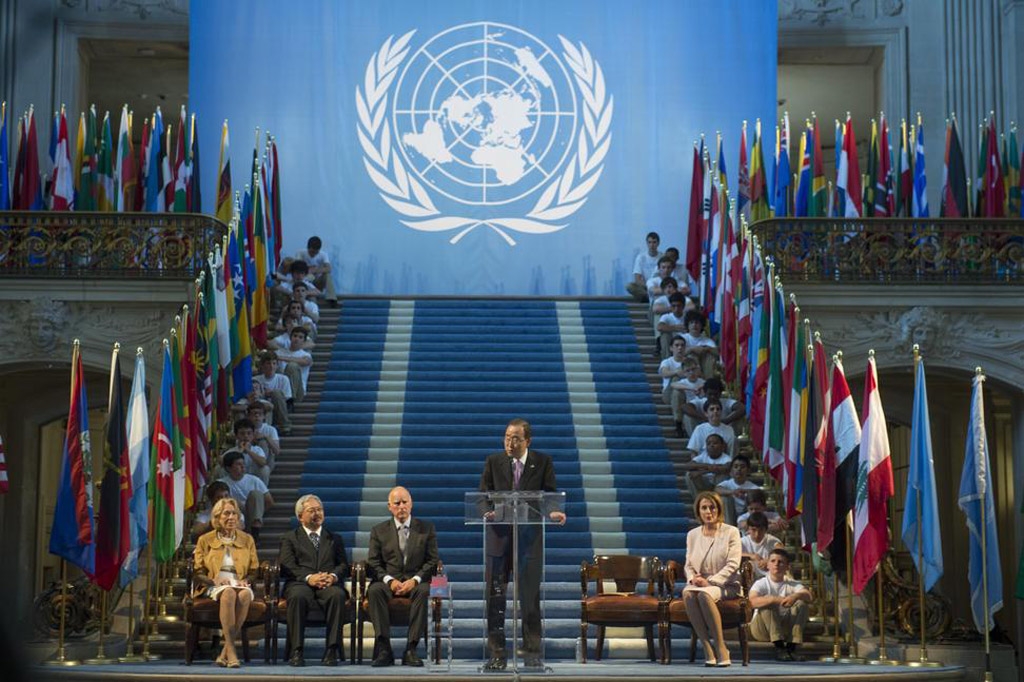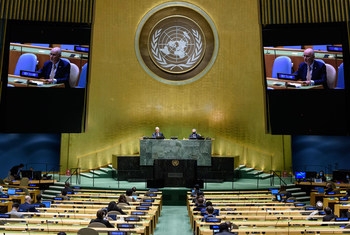We the peoples… Why we need nations united, more than ever.
December 8, 2020

By Elizabeth Feliciano
It all started with the United Nations’ 50 member states committing to “maintain international peace and security; develop friendly relations among nations; achieve international cooperation in solving international problems; and be a center for harmonizing the actions of nations in the attainment of these common ends,” as stated in the UN Charter.
70 years later, it’s 6am, Friday, June 26, 2015 (two weeks before my wedding) and I’m frantically ironing 193 country flags inside the locked doors of San Francisco City Hall in preparation for the UN 70th Commemoration Ceremony that will take place inside the main atrium. Outside City Hall, swarms of San Franciscans gather in celebration of the Supreme Court ruling in Baker v. Nelson that required states to recognize same-sex marriages as equal under the protection granted by the 14th Amendment—the deposit for my wedding photographer was going to have to wait another day.

Fast forward to February 24, 2020, on a crisp day in San Francisco. I’m racing from Ubers to venues as part of an advance trip in preparation for the UN 75th Commemoration. This time, it is set to take place where the charter signing occurred, the famous Herbst Theatre at the San Francisco War Memorial. My mission: to recreate this historic moment while striking the right balance of pomp and circumstance in honor of the 75th Anniversary—no big deal, right?
Then, two weeks later, Black Friday hit—Friday, March 13, 2020. Organizations, schools, and small businesses started to close their doors to the in-person way of life and transitioned to their new norm of conducting business by way of Zoom. The event that started to take shape would never see the light of day, only the light from the monitor, as it fell in line with all other convenings that transitioned to virtual. What was originally intended to be a recommitment celebration and a reminder of why we need the United Nations turned on its head and proved why we need the UN and the value it brings to the global community.

“People are hurting. Our planet is burning.”
Ten months into a COVID world, on September 22, 2020, the UN Secretary-General António Guterres opened the 75th General Assembly by addressing a much different crowd than he had the year before. The COVID-19 pandemic resulted in the first-ever virtual setting for this annual convening of world leaders. He reminded the world that 75 years ago, when the UN was created, the world had just gone through a pandemic, global depression, genocide, and a world war.
In his speech, the SG reflected on a previous address in which he spoke about the four horsemen that were in our global midst: “First, the highest global geo-strategic tensions in years; second, an existential climate crisis; third, deep and growing global mistrust; and fourth, the dark side of the digital world.” Mr. Guterres further went on to speak about the fifth horseman that had joined the cohort since he last spoke: “COVID-19 has laid bare the world’s fragilities. Rising inequalities. Climate catastrophe. Widening societal divisions. Rampant corruption. The pandemic has exploited these injustices, preyed on the most vulnerable, and wiped away the progress of decades.”
Problems without passports
As the pandemic spread, impacting anyone who stood in its way, another global problem started to show its cards. Inequity joined the gang of bandits during the pandemic. We learned that, for the first time in 30 years, poverty rates were rising. Progressive human development indicators are feeling the effects of the shock waves sustained from the pandemic in all countries, not just developing nations. Racial and ethnic minority groups are being hit from multiple angles, with higher rates of positive cases and mortality due to limited access to quality and affordable health care. Those groups are also the most impacted when massive job loss has occurred globally, and those deemed essential were on the frontline of exposure, for example, working as custodians in hospitals and as grocery store clerks.
Can an “ism” save us?
“Americans don’t like the word ‘multilateralism’ because it has too many syllables and it ends with an ‘ism,’” Madeleine Albright famously said. The concept of multilateralism predates the UN Charter itself, but it was the ism that set into motion the international entity that would, 75 years later, be celebrated and scrutinized for its place in the world. But is it still relevant? One could argue that the best defense against a microscopic problem lies in a global solidarity solution. Global, regional, and country-level coordination is critical to detect, prevent, and treat this disease. It will take the collaborative efforts of governments continuing to implement safety measures, corporates supporting the mass scaling and distribution of affordable vaccines once they come to market, and local communities rallying behind their most vulnerable to ensure no one is left behind.
“No one is safe until all of us are safe.”
To that end, the World Health Organization has joined forces with the Coalition for Epidemic Preparedness Innovations (CEPI), Global Alliance for Vaccines and Immunization (GAVI), The Global Fund, FIND, Unitaid, Wellcome, and the World Bank to create the Access to COVID-19 Tools (ACT) Accelerator. This collaboration is a multilateral approach, bringing together governments, scientists, businesses, civil society, philanthropists, and global health organizations to help achieve these aims.
Against this backdrop of the urgent global need to end COVID-19, it does appear that an "ism" can save us. Multilateralism, for all its complexities and syllables, turns out to be our best choice and chance to deliver a better world for "We the peoples..." I am humbled to be playing my small role in it. And as my year at the Virginia Tech Executive MNR program draws to a close, I am glad that my XMNR network of peers know and appreciate the value of collective action, coalition-building, and inclusive decision-making. Sustainability leaders need to know how to work across boundaries, whether geographical, political, or cultural.

Elizabeth Feliciano is the Director of Global Events for the United Nations Foundation, overseeing the production and execution of all pan-foundation marquee and top priorities moments. She also co-leads the UN Foundation’s Green Team, which spearheads the effort to implement a sustainable core strategy for internal- and external-facing events and business practices. She brings 14 years of experience in the events/hospitality industry with a strong focus on negotiations, project management, and client relations. A true Jersey Girl, she holds a B.A. in Political Science from Monmouth University. While she misses real slices of pizza and pork roll, she’s come to know and love Arlington, Virginia as home with her husband and daughter.
Read more about her work at the United Nations Foundation and how she has been able to apply lessons learned in the XMNR program.


